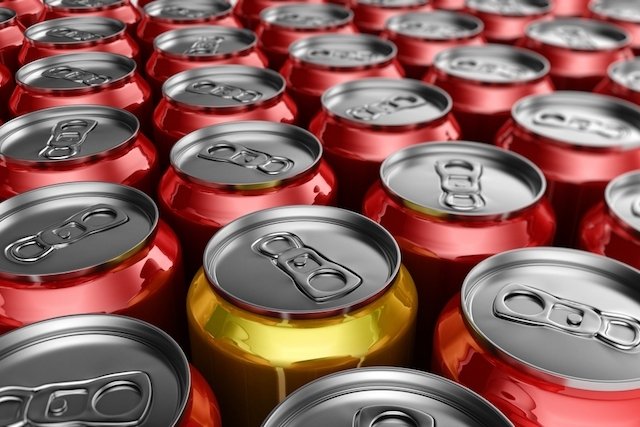Soft drinks are not good for your health because in addition to containing a lot of sugar, they also contain components that can affect the health of various organs.
Furthermore, this type of drink has no nutritional value, so the person is consuming empty calories that do not provide essential nutrients, which favors weight gain and the emergence of some diseases, such as diabetes and hypertension.
Soft drinks also contain phosphoric acid, caffeine, corn syrup, sodium, potassium, colorings and flavorings, which are substances that can cause various health problems when consumed frequently and in the long term.

Some of the main health consequences of consuming soft drinks are:
1. Diabetes
A can of soda contains around 10 tablespoons of sugar, which greatly increases blood sugar levels and reduces the action of insulin in the body, which is the hormone responsible for regulating blood sugar. Therefore, if consumed regularly, soda can increase the risk of developing diabetes.
2. Weight gain
The sugar present in soft drinks is absorbed very quickly in the intestine, which causes blood sugar to rise faster, accompanied by an increased desire to eat. Furthermore, excess sugar also accumulates in the body in the form of fat, being deposited abdominally in the liver and arteries, mainly.
3. Weakening of bones and teeth
Most soft drinks contain a high amount of phosphoric acid that prevents the body from absorbing calcium, which is eliminated in the urine. This makes bones more fragile, increasing the risk of developing osteoporosis in the long term.
Furthermore, the acidity of this type of drink can cause erosions on the surface of the tooth enamel, weakening the teeth. Ingested sugar also increases the risk of tooth decay.
This phosphoric acid also makes it difficult for the stomach to produce gastric acid, delaying the digestion process and nutrient absorption.
4. Kidney stones
Due to the acidity of soft drinks, the body needs to use calcium, which would be used in the bones, to balance the pH of the blood. Therefore, the kidneys need to eliminate the calcium used in this process, which increases the risk of kidney stones forming, due to the accumulation of calcium inside them.
5. Increased blood pressure
Soft drinks can lead to a gradual increase in blood pressure, especially due to their high amounts of sodium and caffeine. Furthermore, caffeine together with sugar can promote inflammation of the digestive system, dehydration and imbalance of intestinal bacterial flora.
Furthermore, some studies indicate that excessive consumption of fructose, which is the sugar present in soft drinks, is also one of the main causes of high blood pressure.
6. Changes in the brain
This type of drink can lead to changes in the brain due to its caffeine content, as it stimulates various substances in the body that may be related to dementia and Alzheimer’s, for example. Furthermore, caffeine can also cause insomnia, agitation, tremors and headache.
Soft drinks also contain another substance called sodium benzoate, which may also be related to changes in memory, motor coordination and attention deficit hyperactivity disorder (ADHD) in children.
7. Changes in intestinal flora
Excessive consumption of foods rich in sugar, such as soft drinks, can interfere with the balance of the intestinal microbiota, causing dysbiosis and favoring the appearance of symptoms such as intestinal gas, nausea and poor digestion, for example.
8. Fatty liver
Excessive consumption of soft drinks increases the risk of developing fatty liver, as they are rich in high-fructose corn syrup, which increases triglycerides and blood glucose, increasing the risk of liver problems.
9. Cancer
Because it is rich in sugar, frequent consumption of soda increases the risk of cancer, even in people who are within their weight. Furthermore, its consumption favors weight gain and the development of diabetes, problems that are also related to an increased risk of cancer.
10. Heart disease
Drinking soft drinks is associated with increased blood sugar, triglycerides and LDL cholesterol, which increases the risk of heart disease.
Why pregnant women and children should not take
Soda is harmful during pregnancy because it causes abdominal discomfort, contributes to weight gain and can cause fluid retention. Furthermore, cola-based soft drinks, such as Coca-Cola and Pepsi, have a lot of caffeine, which during pregnancy cannot exceed 200 mg per day. If a pregnant woman drinks 2 cups of coffee in a day, she can no longer drink caffeine.
Soft drinks that contain caffeine should also not be drunk while breastfeeding because the caffeine passes into breast milk and can cause insomnia in the baby.
In children, soda can hinder physical and mental development, as well as facilitate the onset of diseases such as obesity and diabetes. Soft drinks should be excluded from the baby’s diet, and fruit juices can be opted for, in addition to water, for adequate fluid intake.
How to replace refrigerants
One way to replace soda is by consuming flavored water, also known as flavored water. This is because sparkling water is normally used and fruits are added, such as lemon, strawberry or orange, for example, which can remind you of the flavor of soda. Check out some flavored water recipes.
See nutritionist Tatiana for a healthy recipe to replace soda:

Sign up for our newsletter and stay up to date with exclusive news
that can transform your routine!
Warning: Undefined array key "title" in /home/storelat/public_html/wp-content/plugins/link-whisper-premium/templates/frontend/related-posts.php on line 12
Warning: Undefined array key "title_tag" in /home/storelat/public_html/wp-content/plugins/link-whisper-premium/templates/frontend/related-posts.php on line 13



